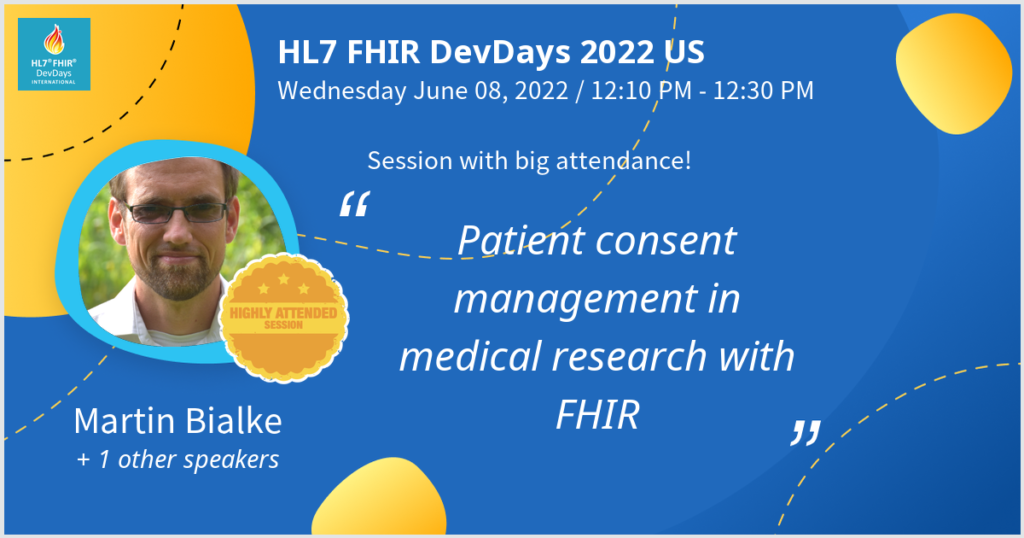The new standard based on HL7 FHIR®, published by HL7 Germany, creates the much-needed uniformity in the digital mapping of patient consents and a breakthrough for medical research in the Medical Informatics Initiative (MII) and the Network University Medicine (NUM), two major research projects of the BMBF.
Presented at FHIR® DevDays in Cleveland, Ohio (USA)
Dr. Martin Bialke (MIRACUM / Trusted Third Party of Greifswald University Hospital) and Stefan Lang (Gefyra GmbH) presented the new HL7-Germany FHIR® standard for digital consent management to the international professional community at this year’s HL7-FHIR® DevDays in Cleveland, Ohio. The FHIR® DevDays are organized annually by HL7 International and represent the central international platform where FHIR® experts worldwide exchange information on FHIR® developments.
With well over 100 people in the audience, the response was impressive:
“The high level of participation, as well as the lively discussion, show that we are meeting an international need with the new standard. This justifies the intensive work of the Consent Management WG over the past four years.”
Dr. Martin Bialke
Joint development by THS of UMG, Gefyra GmbH and MII
Back in 2018, Dr. Martin Bialke and Stefan Lang initiated the HL7 AG Consent Management, in which the now internationally noted standard was coordinated. It solves the problem of the previously missing compatibility of existing technical approaches and solutions within the IHE-/HL7-/FHIR® community. In addition to representatives of the Independent Trusted Third Party of Greifswald University Hospital (THS-UMG) and Gefyra GmbH, the WG also includes experts from all four consortia of the Medical Informatics Initiative (MII, funded by the BMBF).
The presented new HL7-Germany FHIR® standard for consent management combines the established HL7-FHIR® mechanisms with the modular consent concepts of the consent management gICS developed by THS-UMG while maintaining compatibility with IHE approaches. After a successful public voting phase (balloting) on a national level, the standard (STU 1.0.0) was officially adopted in September 2021.
The standard is used in projects such as NUM and MII
“A good example for more interoperability in Germany. The presented results of the working group have been widely discussed in the HL7 FHIR® community internationally and received positively in all aspects.”
Simone Heckmann (CEO Gefyra GmbH, Head of the FHIR® Technical Committee at HL7 Deutschland e.V.)
The new HL7-FHIR® standard creates the technical basis for taking data subject rights into account correctly and automatically when using health data and is already being used in initial applications in MII and NUM. For example, current work by the Task Force Consent Implementation (led by Sebastian Stäubert, SMITH) on the MII core data set module “Consent” is already based on this new standard (link).
Parallel to its practical use in numerous research projects, the standard is to be continuously developed further. The great response at the FHIR® DevDays encourages the Consent Management WG to actively involve international players.

The new standard based on HL7 FHIR®, published by HL7 Germany, creates the much-needed uniformity in the digital mapping of patient consents and a breakthrough for medical research in the Medical Informatics Initiative (MII) and the Network University Medicine (NUM), two major research projects of the BMBF.
Presented at FHIR® DevDays in Cleveland, Ohio (USA)
Dr. Martin Bialke (MIRACUM / Trusted Third Party of Greifswald University Hospital) and Stefan Lang (Gefyra GmbH) presented the new HL7-Germany FHIR® standard for digital consent management to the international professional community at this year’s HL7-FHIR® DevDays in Cleveland, Ohio. The FHIR® DevDays are organized annually by HL7 International and represent the central international platform where FHIR® experts worldwide exchange information on FHIR® developments.
With well over 100 people in the audience, the response was impressive:
Joint development by THS of UMG, Gefyra GmbH and MII
Back in 2018, Dr. Martin Bialke and Stefan Lang initiated the HL7 AG Consent Management, in which the now internationally noted standard was coordinated. It solves the problem of the previously missing compatibility of existing technical approaches and solutions within the IHE-/HL7-/FHIR® community. In addition to representatives of the Independent Trusted Third Party of Greifswald University Hospital (THS-UMG) and Gefyra GmbH, the WG also includes experts from all four consortia of the Medical Informatics Initiative (MII, funded by the BMBF).
The presented new HL7-Germany FHIR® standard for consent management combines the established HL7-FHIR® mechanisms with the modular consent concepts of the consent management gICS developed by THS-UMG while maintaining compatibility with IHE approaches. After a successful public voting phase (balloting) on a national level, the standard (STU 1.0.0) was officially adopted in September 2021.
The standard is used in projects such as NUM and MII
The new HL7-FHIR® standard creates the technical basis for taking data subject rights into account correctly and automatically when using health data and is already being used in initial applications in MII and NUM. For example, current work by the Task Force Consent Implementation (led by Sebastian Stäubert, SMITH) on the MII core data set module “Consent” is already based on this new standard (link).
Parallel to its practical use in numerous research projects, the standard is to be continuously developed further. The great response at the FHIR® DevDays encourages the Consent Management WG to actively involve international players.